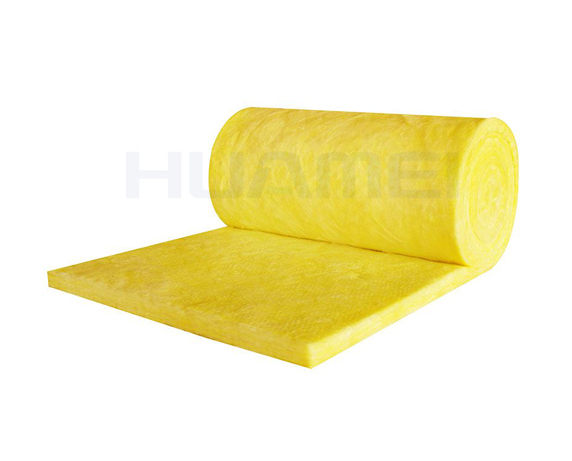E-mail: marketing@hbhuamei.com
Glass wool (originally also known as glass fibre) is an insulating material made from glass fibres, which are arranged with an adhesive to form a wool-like texture. Glass wool and asbestos are made from mineral fibres and are therefore often referred to as "mineral wool". Mineral wool is a generic term for fibrous materials formed by spinning or stretching molten minerals. Glass wool is the product of a furnace at a temperature of around 1450°C of molten glass.
The fibres are spun from the molten glass. The process is based on spinning molten glass in a high-speed spinning head, somewhat similar to the process used to produce marshmallows. During the spinning of the glass fibres, a binder is injected. Glass wool is then produced in rolls or sheets, with different thermal and mechanical glass wool properties. It can also be made into a material that can be sprayed or applied to the surface to be insulated.

Glass Wool
Applications for glass wool include structural insulation, pipe insulation, filtration and sound insulation. Glass wool is a versatile material that can be used to insulate walls, roofs and floors. It can be a loose filler material, blown into the attic or sprayed on the underside of a structure together with a reactive adhesive. Glass wool should always be kept dry during installation, as an increase in moisture content can lead to a significant increase in thermal conductivity.
In the mechanics of materials, the strength of a material is its ability to withstand an applied load without failure or plastic deformation. The strength of material basically considers the relationship between the external load applied to the material and the resulting deformation or change in material dimensions. It is important to consider these factors when designing structures and machines so that the chosen material has sufficient strength to resist the applied load or force and retain its original shape.
Glass Wool
The strength of a material is its ability to withstand such an applied load without failure or plastic deformation. For tensile stresses, the ability of a material or structure to withstand a load that tends to elongate is called the ultimate tensile strength (UTS). Yield strength or yield stress is a material property defined as the stress at which plastic deformation of material begins, while the yield point is the point at which non-linear (elastic + plastic) deformation begins.
In the case of uniform reinforcement with tensile stress (stress-strain curve), Hooke's law describes the behaviour of the reinforcement in the elastic region. This Young's modulus elasticity is the modulus of elasticity for tensile and compressive stresses in the linear elastic region of uniaxial deformation and is usually assessed by tensile testing.
The ultimate tensile strength of glass wool is 0.02 MPa.
Yield strength of glass wool
The yield strength of glass wool is N/A.
The Young's modulus of elasticity of glass wool is N/A.
Let us help you find the best glass wool insulation for your project. When you contact us, please provide your detailed requirements. That will help us give you a valid quotation.
Copyright © Huamei Energy-saving Technology Group Co., Ltd. All Rights Reserved | Sitemap | Privacy Policy
Insulation solutions LIST: Insulation solutions LIST